|
|
|
Sort Order |
|
|
|
Items / Page
|
|
|
|
|
|
|
| Srl | Item |
| 1 |
ID:
189251


|
|
|
|
|
| Summary/Abstract |
Japan-South Korea relations have consistently been presented by International Relations scholars as a puzzle that confounds mainstream rationalist theories, which struggle to explain the consistent acrimony associated with the so-called ‘history problem’. While many scholars have, therefore, adopted conventional constructivist approaches to incorporate history into their analyses, such literature often neglects the processes of (re)construction of this social reality, thereby implicitly treating these negative sentiments as essentialised elements of Korean and Japanese culture/identity which cause certain foreign policies. Using the recent Japan-South Korea trade dispute as a case study, this article instead draws on critical constructivist/poststructuralist theory and discourse analytical methods to examine how the ‘history problem’ is produced and reproduced. It argues that dominant discourses of remembering in South Korea, which represent Japan as an unrepentant colonial aggressor, and of forgetting in Japan, which represent South Korea as emotional and irrational for dwelling on the past, act to (re)produce identities that clash in their attitudes to difficult history. While such foreign policy practices (re)produce dominant national identities, these identities also shape the bounds of which foreign policies are legitimate or imaginable. This mutually constitutive relationship between identity and foreign policy continually reproduces the ‘history problem’ in Japan-South Korea relations.
|
|
|
|
|
|
|
|
|
|
|
|
|
|
|
|
| 2 |
ID:
159131
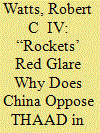

|
|
|
|
|
| Summary/Abstract |
China’s purported fears about the introduction of defensive missiles into South Korea are likely insincere
or misplaced, leaving concerns about the beneficial effects on U.S. alliances as the probable
explanation for its opposition.
|
|
|
|
|
|
|
|
|
|
|
|
|
|
|
|
| 3 |
ID:
140724


|
|
|
|
|
| Summary/Abstract |
In this paper I examine the extent to which preferential trade agreements (PTAs) limit the Australian government's ability to use public procurement for local industry development ends. I do so not only by examining Australia's PTA obligations, but also by examining how other governments with similar obligations—such as Korea—are using public purchasing policies to promote local industrial advancement. I find that the PTA obligations of the Australian and Korean governments leave them both significant scope to use public purchasing strategically. Interestingly, however, Australian policymakers have been standing still in the room that remains, and even abandoning PTA-compliant procurement-linked development policies. South Korean policymakers on the other hand have been capitalising on every inch of space left open to them—and even experimenting with new forms of strategic public purchasing that nonetheless comply with their international obligations. I conclude by offering some suggestions as to how we might explain these countries’ radically different approaches to procurement policy, despite their very similar international obligations.
|
|
|
|
|
|
|
|
|
|
|
|
|
|
|
|
| 4 |
ID:
159181
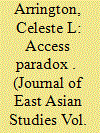

|
|
|
|
|
| Summary/Abstract |
To what extent is a diverse news media environment good for activists who seek attention for their cause? Scholars agree that activist groups depend on the media to reach policymakers and bystanders. Yet prior scholars have overlooked how factors that contribute to media environment diversity—including journalistic norms, market structures, outlets’ partisanship, and audiences’ news consumption habits—can have contradictory implications for activist groups. Disaggregating questions of gaining publicity from questions of the message and reach of coverage, this article shows that while pluralistic media environments are more accessible to activists, more homogeneous media environments help groups that manage to break into the mainstream news reach wider audiences with more coherent narratives. These findings challenge common assumptions about the news media in Japan and Korea. A paired comparison of hepatitis C-related activism in both countries demonstrates how the forces democratizing access to the media are paradoxically reducing the persuasive potential of publicity.
|
|
|
|
|
|
|
|
|
|
|
|
|
|
|
|
| 5 |
ID:
129766
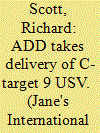

|
|
|
| 6 |
ID:
156310
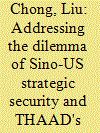

|
|
|
| 7 |
ID:
140331
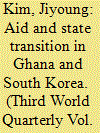

|
|
|
|
|
| Summary/Abstract |
This paper examines the questions of why and how foreign assistance was utilised successfully in South Korea but less so in Ghana, with a focus on the role of aid in the process of state building and state transition in these two countries. As multiple policy makers and scholars have noted, in 1957 South Korea and Ghana shared similar levels of GDP per capita, yet South Korea then achieved rapid economic development and democracy in one generation, while Ghana suffered from slow development and a general deterioration of the standard of living. In this study I adopt a comparative historical research method to explain the divergent paths of these two countries, with a special focus on the impact of foreign assistance on state transitions. I argue that contextual factors – including the effect of the colonial legacy in each of these two regions in shaping modern states, and the specific characteristics of foreign assistance intervention – provide useful insights in explaining the differential impact of aid on state building and state transition in Ghana and in South Korea.
|
|
|
|
|
|
|
|
|
|
|
|
|
|
|
|
| 8 |
ID:
158651
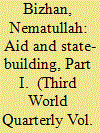

|
|
|
|
|
| Summary/Abstract |
Under what conditions does foreign aid in the aftermath of war foster state-building? This article argues that institutional legacy and continuity and the politics of aid may matter. In the aftermath of war, for an aid regime to reinforce state-building, it may need to ensure continuity in the strength of the state and to use recipient mechanisms and finance policies that generate a greater state capacity. The existence and continuity of a Weberian state may increase the likelihood of effective state-building. If the state is relatively strong, with a Weberian bureaucracy, aid can further reinforce it when aid is spent through national systems or is aligned with local priorities, with efforts to ensure that the recipient leaders reinforce state effectiveness by implementing policies that may require greater state capacity. Evidence for this argument is provided through pairwise comparison of state-building patterns between South Korea and Taiwan.
|
|
|
|
|
|
|
|
|
|
|
|
|
|
|
|
| 9 |
ID:
146645
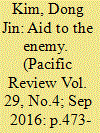

|
|
|
|
|
| Summary/Abstract |
This article discusses the link between development and peacebuilding to analyze South Korean aid activities in North Korea in the context of the Korean conflict, where there are deep-rooted cycles of conflict episodes, and to explore the possibility of aid for peace on the Korean peninsula in the future. The Korean conflict is a large part of what makes South Korean aid to North Korea ineffective. For the past 20 years, South Korean aid to North Korea has fluctuated greatly, due to the context of the Korean conflict. The Korean conflict, once seemingly on the way to resolution, appears to have reverted to a time before the end of the Cold War. Many people in both the North and the South still see each other as the enemy. Most of the South Korean aid projects in North Korea have been suspended indefinitely and the fluctuation of aid to North Korea caused serious debates within South Korean society. At one point, the debates grew so heated that they were called the ‘South–South conflict’. Building on the conceptual framework of conflict sensitive development and strategic peacebuilding, this article argues that, to overcome the current impasse, all stakeholders must better understand the context of the Korean conflict and the interaction between the context and themselves, and develop a comprehensive strategy together, to encompass the multiple issues raised by the Korean conflict, as strategic peacebuilding proposes.
|
|
|
|
|
|
|
|
|
|
|
|
|
|
|
|
| 10 |
ID:
160990


|
|
|
|
|
| Summary/Abstract |
With the continued use of unsafeguarded naval nuclear-propulsion programs in all nuclear-weapon states, the commissioning of an Indian nuclear submarine, and the potential investment in such programs by non-nuclear-weapon states including Brazil and South Korea, movement toward a regulatory regime for nuclear material in the naval sector has become imperative. Such a framework faces a recurring debate on adequately protecting sensitive military technology while delivering assurances that naval nuclear material is not diverted to nuclear-weapon programs. In this viewpoint, we examine various prospective mechanisms to regulate naval nuclear stocks and assess them in terms of their effectiveness and scope. Drawing on lessons from the drafting, negotiation, and implementation of the Model Additional Protocol, we recommend a safeguards regime for naval nuclear material via a protocol that supplements the existing global nuclear-governance system. This protocol provides a standardized yet flexible approach to naval nuclear-material safeguards across all states (whether nuclear-weapon states, non-nuclear-weapon states, or outside the Treaty on the Non-Proliferation of Nuclear Weapons) to handle variations among naval nuclear fuel cycles and technologies.
|
|
|
|
|
|
|
|
|
|
|
|
|
|
|
|
| 11 |
ID:
168592
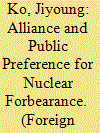

|
|
|
|
|
| Summary/Abstract |
How does a patron state dampen a client state's domestic aspirations for developing nuclear weapons? What nonproliferation tools most effectively induce a client state's domestic preference for nuclear forbearance? This article assesses the relative effectiveness of three nonproliferation tools available to a nuclear patron: a declaration of extended deterrence, forward deployment of nuclear weapons, and a conditional threat of punishment. More specifically, using experimental data on the South Korean public, this article examines whether nuclear forward-deployment and a conditional threat of punishment are more effective than a declaratory policy in enhancing the credibility of extended deterrence and curbing public aspirations for nuclearization. The experimental results show that neither nuclear forward-deployment nor a conditional threat of punishment reduces public support for nuclear armament significantly more than a declaratory policy. They also reveal that compared to when a nuclear ally does not exist, the three nonproliferation tools do not necessarily dampen the public's preference for developing indigenous nuclear weapons. The robustness of the findings is assessed using an experiment on a small sample of government officials. Taken together, this study provides the first experimental evidence on public perception of different nonproliferation tools in a client state.
|
|
|
|
|
|
|
|
|
|
|
|
|
|
|
|
| 12 |
ID:
094147
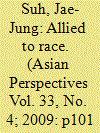

|
|
|
| 13 |
ID:
060647
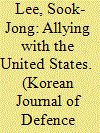

|
|
|
| 14 |
ID:
099766
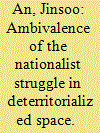

|
|
|
|
|
| Publication |
2010.
|
| Summary/Abstract |
This articale introduces a body of south Korean flims from the 1960's known collectiviety under the subgenre of Manchurian action flim and examines its ambivalant respresentation of anticolonial nationalism. Set in Manchuria during the colonial period (1910-1945), these films conventionally portray Korean nationalists armed struggle against the Japanese imperial force.This artical attempts to contextualize South Korea
Manchurian action flim first by relating the genre to Korea's modern historical dicourse of Manchuria and soucial memory of the Korean diapora experience
|
|
|
|
|
|
|
|
|
|
|
|
|
|
|
|
| 15 |
ID:
130239
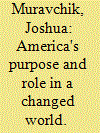

|
|
|
|
|
| Publication |
2014.
|
| Summary/Abstract |
Almost every war that America has fought since the beginning of the twentieth century was a war America had determined to avoid. We were neutral in World War I?.?.?.?until unlimited submarine warfare against our trans-Atlantic shipping became intolerable. We resisted entering World War II until Pearl Harbor. We defined the Korean peninsula as lying outside our "defense perimeter," as our secretary of state declared in 1950, a few months before North Korea attacked South Korea and we leapt into the fray. A few years later, we rebuffed French appeals for support in Vietnam in order to avoid involving ourselves in that distant country which was soon to become the venue of our longest war and greatest defeat. In 1990, our ambassador to Iraq explained to Saddam Hussein that Washington had "no opinion on?.?.?.?your border disagreement with Kuwait," which he took as encouragement to swallow his small neighbor, forcing a half million Americans to travel around the world to force him to disgorge it. A year after that, our secretary of state quipped about the violent disintegration of Yugoslavia that "we have no dog in that fight," a sentiment echoed by his successor, of the opposite party, who, demonstrating his virtuosity at geography, observed that that country was "a long way from home" in a place where we lacked "vital interests"-all this not long before we sent our air force to bomb Serbia into ceasing its attacks on Bosnia and then bombed it again a few years later until it coughed up Kosovo.
|
|
|
|
|
|
|
|
|
|
|
|
|
|
|
|
| 16 |
ID:
060654
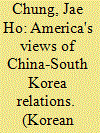

|
|
|
| 17 |
ID:
051909
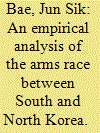

|
|
|
| 18 |
ID:
068535
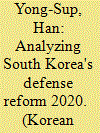

|
|
|
| 19 |
ID:
137631
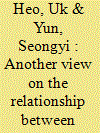

|
|
|
|
|
| Summary/Abstract |
Armed Forces and Society recently published an article, ‘‘Intra-Military Division and Democratization in South Korea’’ by Insoo Kim. In the article, Kim argues that economic development and civil society explanations for South Korea’s democratization are not sufficient because conflict in the military undermined the ability of Chun’s government to suppress the democracy movement, which made the transition possible. We refute Kim’s argument because economic development clearly made significant contribution to South Korea’s democratization by enhancing education attainment and facilitating industrialization and urbanization. Moreover, there is no clear evidence of schism in the military or among political elites, and the authoritarian leader Chun Doo-hwan agreed to change the presidential election system based on his political calculation.
|
|
|
|
|
|
|
|
|
|
|
|
|
|
|
|
| 20 |
ID:
023691


|
|
|
|
|
| Publication |
Winter 2002-03.
|
| Description |
109-122
|
|
|
|
|
|
|
|
|
|
|
|
|
|
|
|
|
|
|
|
|